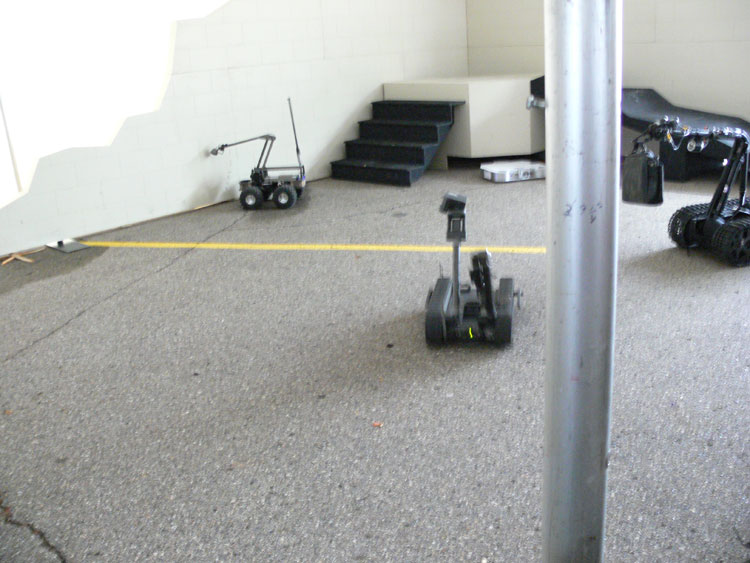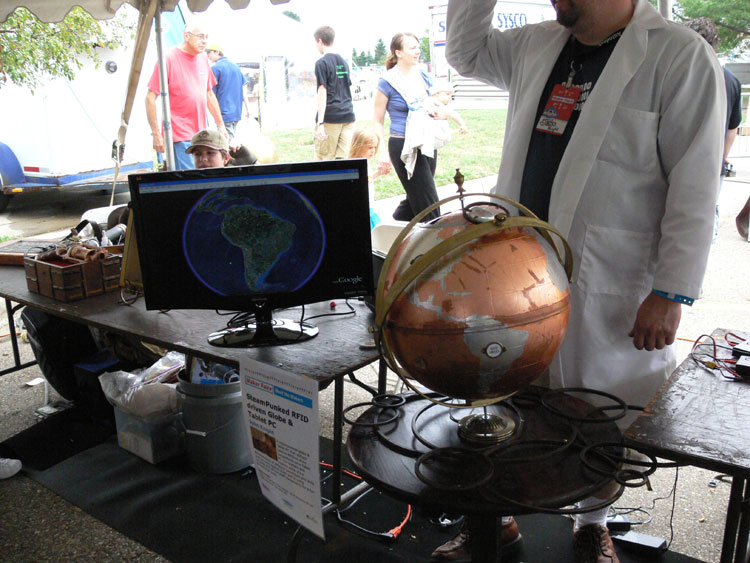
Maker Faire Detroit Saturday Highlights
Tue, 10 Aug 2010 18:05:25 EST
Going to Maker Faire Detroit was a very interesting and inspiring. It was one of the best events I have been to in recent years. I wasn't able to see everything, especially the indoor exhibits in the museum, but I got a heap full of fabrication goodness at least.
My personal favorite activity were the military robots the Army had on display. They were actually letting youngsters ram around three robots with no constraints. The kids were smashing them into each other and even causing collisions so large that they were moving the containment barriers. The Army guys would just kick the barriers back in place. Traditionally you wouldn't see free reign with such expensive equipment which is why I appreciated it so much. I'm sure that some of the young guys and gals operating the robots are going to end up being engineers.
Based on my job in the museum industry, the biggest relief I saw was the RFID based globe which was covered on just about every popular technology site. Because this is my personal site I don't feel bad bashing some of the technology nightmares I have to deal with at work. The main company in the museum globe space is, Global Imagination with their Magic Planet; which is a piece of junk. I had to program one of these for a science center and have seen them deployed in other centers. They are always disappointing. Unless you use the default blue marble map, the rest are very low quality. Contacting Global Imagination for technical support is also a nightmare as no one is ever available. It is good to see some competition which may be able to provide a better presentation.
I was happy to talk to the representative from Alibre software. I'll be learning how to do parametric CAD on their software after reviewing the other offerings.
One of the biggest ideas I witnessed was the notion of a mobile fabrication lab. The MIT fab lab was on site. They jam packed a trailer full of CNC and prototyping equipment essentially creating a mobile shop. This really seems like a brilliant idea because I think it not only allows more versatility in localization, but I am pretty sure it would allow someone to skate around zoning restrictions, insurance premiums, and huge capital investments tied to a traditional fabrication facility. It was funny when I asked the presenter about his knowledge of zoning restrictions. He looked like a deer in the headlights of a car and quickly avoided me.
In terms of friendliness, the Salamander Wireless Water Sensors booth was my favorite. They explained in detail how their neat water sensor system worked. Adam even found a good data logging board based on parts the Salamander was using for his Megasquirt custom computer that he installed in his Subaru. The Salamander is meant to be a passive water quality monitoring system that is affordable.
My personal favorite activity were the military robots the Army had on display. They were actually letting youngsters ram around three robots with no constraints. The kids were smashing them into each other and even causing collisions so large that they were moving the containment barriers. The Army guys would just kick the barriers back in place. Traditionally you wouldn't see free reign with such expensive equipment which is why I appreciated it so much. I'm sure that some of the young guys and gals operating the robots are going to end up being engineers.
Based on my job in the museum industry, the biggest relief I saw was the RFID based globe which was covered on just about every popular technology site. Because this is my personal site I don't feel bad bashing some of the technology nightmares I have to deal with at work. The main company in the museum globe space is, Global Imagination with their Magic Planet; which is a piece of junk. I had to program one of these for a science center and have seen them deployed in other centers. They are always disappointing. Unless you use the default blue marble map, the rest are very low quality. Contacting Global Imagination for technical support is also a nightmare as no one is ever available. It is good to see some competition which may be able to provide a better presentation.
I was happy to talk to the representative from Alibre software. I'll be learning how to do parametric CAD on their software after reviewing the other offerings.
One of the biggest ideas I witnessed was the notion of a mobile fabrication lab. The MIT fab lab was on site. They jam packed a trailer full of CNC and prototyping equipment essentially creating a mobile shop. This really seems like a brilliant idea because I think it not only allows more versatility in localization, but I am pretty sure it would allow someone to skate around zoning restrictions, insurance premiums, and huge capital investments tied to a traditional fabrication facility. It was funny when I asked the presenter about his knowledge of zoning restrictions. He looked like a deer in the headlights of a car and quickly avoided me.
In terms of friendliness, the Salamander Wireless Water Sensors booth was my favorite. They explained in detail how their neat water sensor system worked. Adam even found a good data logging board based on parts the Salamander was using for his Megasquirt custom computer that he installed in his Subaru. The Salamander is meant to be a passive water quality monitoring system that is affordable.

Charles Palen has been involved in the technology sector for several years. His formal education focused on Enterprise Database Administration. He currently works as the principal software architect and manager at Transcending Digital where he can be hired for your next contract project. Charles is a full stack developer who has been on the front lines of small business and enterprise for over 10 years. Charles current expertise covers the areas of human pose estimation models, diffusion models, agentic workflows, .NET, Java, Python, Node.js, Javascript, HTML, and CSS. Charles created Technogumbo in 2008 as a way to share lessons learned while making original products.
Comments
No one has posted any comments yet, be the first
Comments are currently disabled.


